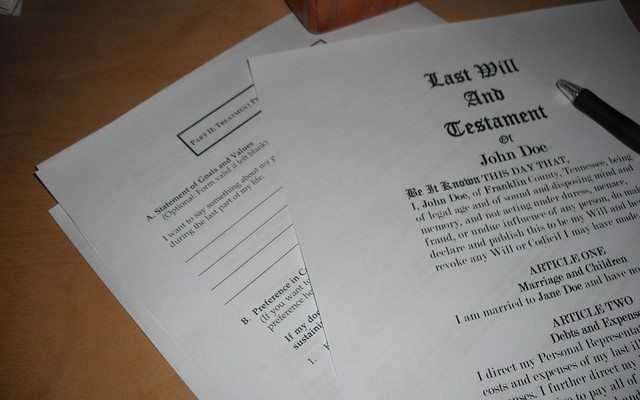 Image courtesy of [Ken Mayer via Flickr]
Image courtesy of [Ken Mayer via Flickr]
Law
From Your Finances to Social Media Accounts, What Happens After Death?
It might seem a bit morbid to think about it, but chances are that you already have: what are your rights once you have died? It’s a sad reality, but what legally happens after we die is something that requires our consideration.
The answers might not seem as clear as they should be, and there have been many cases recently that might make you think twice about waiting to memorialize your expectations for the celebration of your life. You often hear someone say, “It’s what she would have wanted” or “He told us before he died that he wanted…” but what happens if you don’t tell someone what you want? Worse yet, what happens if your family and friends know what you want, but are under no legal obligation to listen? With the sheer amount of material goods we collect, from money to possessions to even social media accounts, what happens to it all when we are no longer there to take care of it?
What is a Will?
In a technical sense, a will is
A written document which leaves the estate of the person who signed the will to named persons or entities (beneficiaries, legatees, divisees) including portions or percentages of the estate, specific gifts, creation of trusts for management and future distribution of all or a portion of the estate (a testamentary trust). A will usually names an executor (and possibly substitute executors) to manage the estate, states the authority and obligations of the executor in the management and distribution of the estate, sometimes gives funeral and/or burial instructions, nominates guardians of minor children and spells out other terms.
Basically, a will is a way to control what happens to you, your family, and your material possessions, as well as guarantee that everything will be done legally the way you want it to be done.
There are several formalities you will need to go through before your will is determined to be valid and legally enforced. Most people will see a lawyer to help them make a will, but you could do it yourself as long as you follow the legal requirements, which can be tough. Sometimes people go in the wrong direction when it comes to wills, and it becomes just a symbolic piece of paper with no real meaning. As such, it’s best to work with a professional.
Lawyers make a lot of money from wills that are poorly or weakly worded. A will needs to be clear and unambiguous or it creates tensions and arguments that go nowhere, costing everyone more money in lawyer fees.
According to the website Do Your Own Will, if you are in the know, the legal requirements are quite easy to comply with, and even easier to write. If your will is found to be invalid after your death, however, your estate will be distributed according to certain rules in law, and not necessarily according to your will.
The number one rule? Anyone who writes a will must be at least 18 years of age, and of sound mind. There is no limit on one’s age, though past a certain age it is recommended to start sooner, as the “sound mind” can start to go. Being of sound mind means that you are aware of what a will is, who the people in the room are, who your beneficiaries are, and you must not be under pressure. Writing a will is your own decision, and when you sign it, it must be done in front of at least two witnesses, not including a spouse. You know those movies where the person states his or her will into a tape recorder? Not quite a reality–it still needs to be in ink, as a video can be easily damaged.
You should clearly lay out who gets anything from your estate; material possessions, monetary accounts including stocks and bonds, and property should all be considered. Remember that any debt you have will have to be paid off in full before any beneficiaries receive money.
A will is equalizing–whether you are leaving a few coins in your piggy bank or a multibillion dollar account, the same rules apply. If you have taken the time to craft a will that lays out in detail who will get what, it must be worth your time to ensure that the will is binding in the eyes of the law. It will not be you, but your intended beneficiaries, who stand to suffer if it is not.
Social Media Will
Of course technology causes some trouble with wills and what to do with those accounts of yours. For anyone who has had a friend or family member die, seeing his or her social media profile can be a great way to remember and celebrate, or it can bring sadness and more grief. If you are active online, consider making a social media will. While writing your will, you can include a special section on social media, or you can create an entirely separate document. A separate will is usually intended for accounts people don’t know exist–such as a blogger alter-ego. Whatever you put online, from pictures, edits, songs, fanfiction, and even your status updates all belong to you. You can let them linger on forever, or you can put someone in charge of deleting content. Just remember that on some sites, like Pinterest and Tumblr, it is impossible to really delete posts if they have been reblogged or repinned.
You can also include provisions about things like your online sites that collect money, like Etsy, but that could also fall into the monetary section of your regular will.
You should appoint someone you trust who will be responsible for the closure of your email addresses, social media profiles, and blogs, if you so wish. Social media is a part of daily life, so what happens to the online content that you created once you die?
In your social media will, you should do the following:
- State how you want the profiles to be handled. You can break them down into specific websites. For instance, maybe you want your Twitter deleted, but want to keep your YouTube videos up.
- Give the social media executor a document that lists that websites you have a profile on, including your usernames, passwords, and security questions.
- If you don’t know your online executor in person, appoint someone to contact that person at your death.
- Check to see if your profiles have account management features that will allow you to manage what happens to your accounts after you die.
What happens if a will isn’t valid?
A will isn’t valid if someone simply writes it on a piece of paper and allows the family to find it. Lately, people have been leaving Word documents, social media posts, blog drafts, and even YouTube videos. Having an invalid will is the same as not having one at all, and in that case, according the American Bar Association:
Since your property must still be distributed, the probate court in your area will appoint someone as the administrator of your estate to distribute the property in accordance with the state laws. The costs associated with this are more expensive than having an executor named by you in advance and must be paid out of your estate before any property is distributed.
Sadly, this happens all too often. The section below details several of the most famous incidents of people who didn’t (or won’t, in one case) get quite what they wanted after death.
Case Studies: Wills Gone Wrong
Michael Jackson
One of the most contentious battles in recent history is the one over the estate of Michael Jackson. When Jackson died he was in a state of bankruptcy, but he still had many assets, including his and The Beatles’ song catalogs. Jackson’s siblings Janet, Jermaine, Rebbie, Tito, and Randy sent a letter to the men overseeing his estate, John Branca and John McClain, accusing them of fraud and saying that the will in use was, “without question, Fake, Flawed and Fraudulent.”
The executors fired back: “Any doubts about the validity of Michael’s will and his selection of executors were thoroughly and completely debunked two years ago when a challenge was rejected by the Los Angeles County Superior Court, the California Court of Appeals and, finally, the California Supreme Court.” The only family members named in the will were Jackson’s mother and his three children.
In a now-deleted tweet, the King of Pop’s daughter said: “I will defend my beloved family member with all i have, even if it means from other family members…at this point i don’t care what people call me or if they think i’m a bad person…if it means sticking up for my grandmother i will do it.”
It’s clear how messy it can get when wills are involved, especially when the validity is in question.
There were some problems with the will, including taxes, although it is unclear if the problems stemmed from the writing of the will or the estate itself. In February 2014, the Internal Revenue Service reported that Jackson’s estate owed $702 million, including $505 million in taxes and $197 million in penalties after claims that the estate undervalued Jackson’s fortune.
As Jackson’s death came suddenly, it is unclear whether or not he would have revised the will to include his siblings, or if he would have perhaps taken care of some of his payments.
Leelah Alcorn
In one of the most heartbreaking cases of late, Leelah Alcorn, an Ohio transgender teen who committed suicide after citing her parent’s inability to accept her, wrote a will on her Tumblr page shortly before her death. In her note, she specifically stated:
As for my will, I want 100% of the things that I legally own to be sold and the money (plus my money in the bank) to be given to trans civil rights movements and support groups, I don’t give a s**t which one. The only way I will rest in peace is if one day transgender people aren’t treated the way I was, they’re treated like humans, with valid feelings and human rights.
Since Alcorn was not 18, nor was the will legally binding, her parents are not legally obligated to observe her final wishes. While MSNBC reports that Alcorn’s funeral service was private due to threats, it is possible that she was buried under her birth name, Joshua.
Tom Bridegroom
In one of the most publicized documentaries of 2013, Bridegroom, Shane Bitney Crone tells the story of the life and loss of his partner Thomas Lee “Tom” Bridegroom, who died in a tragic accident. After Bridegroom’s death, Crone found himself cut off and deprived of any legal protection due to the face that Bridegroom did not have a will.
The film chronicles the story of their six-year relationship and the struggles Crone faced after Bridegroom’s death, including the family not allowing Crone to attend the funeral of his life partner. In it, he tells that Bridegroom’s mother came and took almost everything that remained of his life, including his clothes and personal belongings.
When it came time to go to the funeral, Crone was told his safety would be threatened by Bridegroom’s family if he went. Bridegroom didn’t have a will, so he could not lay out what he wanted, and more importantly, who he wanted at his funeral.
Conclusion
It’s morbid to think about what you want after death. What do you want to wear, who do you want to speak, what music do you want to play? But it’s also important to think about all that you have to your name, and who you would trust most with everything from your book collection to your Instagram account. It’s all going to be there for as long as you let it. While it’s great to tell someone that he or she can have a specific item, or tell your cousin to clear your internet history before anyone else can see it, you have to give them the legal authority.
Resources
American Bar Association: What happens if I die without a will?
American Bar Association: What do I have to do to make my will legally valid?
NY Daily News: Michael Jackson’s cut-out siblings say lawyers forged his signature on will
MSNBC: Leelah Alcorn’s suicide note pointed out societal problems
E News: Michael Jackson’s “Fake, Flawed” Will—The Battle Rages
Huffington Post: Why You Need a Social Media Will
AmericaBlog: Worst parents in the world?
Woman’s Day: 6 Things You Need to Know About Writing a Will








Comments